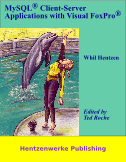Robert Jennings posts Yet “Another Life After VFP Thread.” For those not following VFP closely, MS recently announced a confirmation of earlier news that there were no plans for a VFP version 10, and that the VFP scripts in the project known as Sedna would be released under some sort of public license. Poor communications lead to media and Slashdot reports that VFP was to be Open Sourced, sadly not the case.
Robert does a good job of outlining the huge cost in moving a vertical-niche application into another development environment, language and runtime. Most sophisticated specialty applications have person-years of investment built into them, knowledge not easily extracted, transferred or translated to any new environment. Regardless of whether that new environment is Dot Net, Dabo, LAMP, Python or Visual Fred, there will be a huge cost and risk with any enterprise making this switch.
Unlike the Open Source world, when a vendor choses to discontinue a product, developers have little choice but to move along. While many folks point out the upside that the product will likely run for years to come, and a lack of Microsoft official support doesn’t instantly obsolete a product (DOS apps can still be found, after all), there is an immediate slowdown in the custom software market, and a longer-term turning away from the product by customers. Large-scale vertical products have to be operating with 5- and 10-year plans for reinvestment and changes in direction, to ensure they can fund “The Next Big Thing” while continuing to deliver good value to their customers today and tomorrow.
This is not a death knell for the product. The writing has been on the wall for years. But developers with large applications have to be looking around for a new platform.
FoxPro developers always viewed themselves with a bit of “Battlestar Galactica” mythology: a rag-tag crew of self-taught developers from the PC Revolution, they survived the dBASE wars and the implosion of Ashton-Tate. Working under a cruel master who never promoted their product, they persevered. MS’ internal team developing VFP did amazing things on a shoestring budget, introducing a fairly smooth transition from procedural to object-oriented, from developer-guided to event-driven interfaces, from characters to pixels, from local ISAM to RDBMS. The VFP IDE was a remarkable environment in which to develop rich-client, component-based, web-driven or even server-based applications. I will miss it, and look forward to becoming as skilled at my next platform.

 Followers of the Hentzenwerke Publishing empire know that Whil Hentzen has the largest catalog of Visual FoxPro books and an impressive collection of books bridging the gap from the Windows world into the Linux/Free/Open Source world. Whil’s been working for quite some time to put together a book on working with VFP and back-end data servers other than SQL Server. I was one of the many community members who contributed comments, criticisms and ideas to the book, and was honored when Whil chose to designate me as technical editor. Whil Hentzen announces,
Followers of the Hentzenwerke Publishing empire know that Whil Hentzen has the largest catalog of Visual FoxPro books and an impressive collection of books bridging the gap from the Windows world into the Linux/Free/Open Source world. Whil’s been working for quite some time to put together a book on working with VFP and back-end data servers other than SQL Server. I was one of the many community members who contributed comments, criticisms and ideas to the book, and was honored when Whil chose to designate me as technical editor. Whil Hentzen announces,